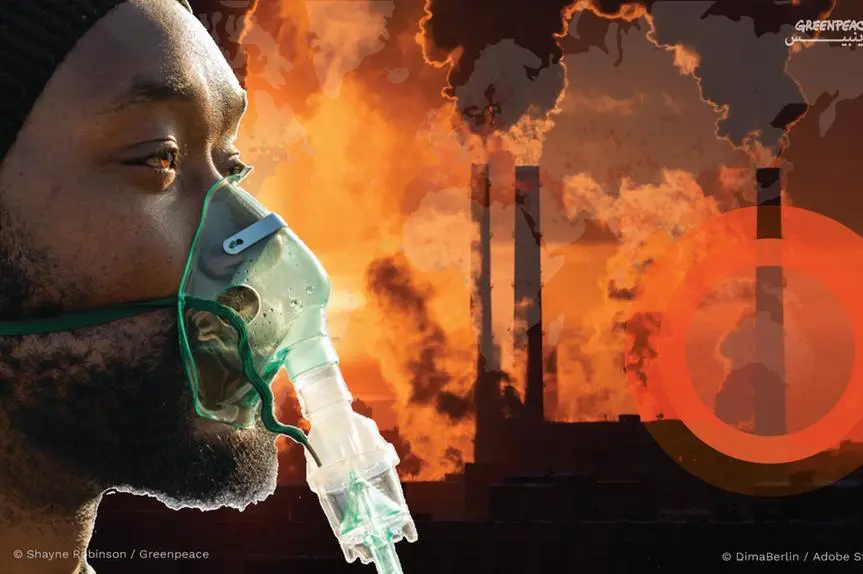PHOTO
- Breathe out... Don't breathe in: the air we breathe in North Africa conceals a silent killer that can no longer be ignored. Air pollution is not just a problem; it's an alarming crisis with consequences too deadly to overlook.
Beirut – Significant number of premature deaths occur annually due to exposure to air pollution in North African countries, as revealed in a report jointly prepared by Greenpeace MENA and Greenpeace Africa. The report, titled “Major Air Polluters in Africa Unmasked," reveals shocking data about the continent's biggest air polluters and how Africans are facing a public health crisis that requires immediate action from the governments.
The report reveals a significant number of premature deaths occur annually in Africa due to exposure to air pollution. Egypt has been identified as one of the North African countries bearing a substantial burden of health diseases shockingly.
The weight of polluted air burdens those least prepared to handle it revealing significant injustice as the crisis does not affect everyone equally.
Among the ten biggest sources of sulphur dioxide air pollution in Africa, two are power plants located in Egypt and Morocco. Recent estimates suggest the energy sector is the major contributor to nitrogen dioxide, volatile organic compounds, and sulphur dioxide emissions in North Africa. Residential combustion, particularly solid fuel burning, stands out as a substantial source of black carbon emissions.
Inaction takes a toll on human lives; The report presents recommendations to address the crisis, emphasizing the need for strong legal air quality standards, improved air quality monitoring, reduced waste burning, and investment in clean energy technologies, especially in the energy sector.
"We urgently call upon North African governments to adopt the report’s recommendations particularly the installation of air quality monitors and ensuring access to real-time data. This proactive approach empowers affected communities to address their governments for action, to take charge of their well-being, make informed decisions, and collectively work towards cleaner and healthier environments" stresses Sarra Ben Abdallah, Greenpeace MENA Campaigner.
Besides the shocking data, the report highlights hopeful case studies that address air pollution by advocating peaceful resistance and promoting viable solutions.
Ayoub Krir, Researcher and Environmental Activist, President of the Oxygen Association for Environment and Health in Kenitra Morocco, confirms that “air pollution in Kenitra poses a real challenge to the environment and public health. What is happening in Kenitra reflects the reality in many cities and regions in Africa, hindering the achievement of global climate goals and impeding African economies with losses in billions of dollars, as well as a cost in human lives.”
Key Findings from the Report:
- In North Africa, the energy sector, especially the oil and gas industry, is considered the largest contributor to air pollution emissions (NO2, SO2, and VOCs).
- Satellite observations of sulphur dioxide in North Africa identify air pollution hotspots in Egypt, Libya, Morocco, and Tunisia.
- The World Bank report for 2022 indicates that Algeria and Libya are in the world’s top 10 countries for oil and gas flaring; such flares are likely to contribute to the energy sector emissions for this region.
- Egypt scores the highest rates of deaths resulting from PM2.5 air pollution with particles, among North African countries.
- Egyptian life expectancy average could have been improved by 1.3 years longer if the WHO air quality guidelines had been met in 2021.
- In Egypt, dust contributed most to PM2.5 air pollution, while in Morocco, nearly 53% of ambient PM2.5 was attributed to industries, 35% to dust, and 13% to traffic.
- 13% of households in North Africa rely on the use of solid fuel for cooking.
For more information and to access the full report, please visit English [LINK], Arabic [LINK] and French [LINK].
-Ends-
About Greenpeace MENA:
Greenpeace MENA is a non profit completely independent - politically and financially organization. Established in 2018, we are one of the newest offices of the Greenpeace global network that consists of 27 independent national and regional organizations in over 55 countries as well as its co-ordinating body, Greenpeace International. The MENA region is our home. We work creatively and collaboratively to reduce the environmental, economic, and social impacts of climate disasters and push local and innovative solutions, empowering our communities to flourish and live in harmony with their environment.
Note: Please credit Greenpeace Africa and Greenpeace MENA when using the information from the report.
For media inquiries, please contact Hiam Mardini, Media and Communications Manager at Greenpeace MENA at hmardini@greenpeace.org




















